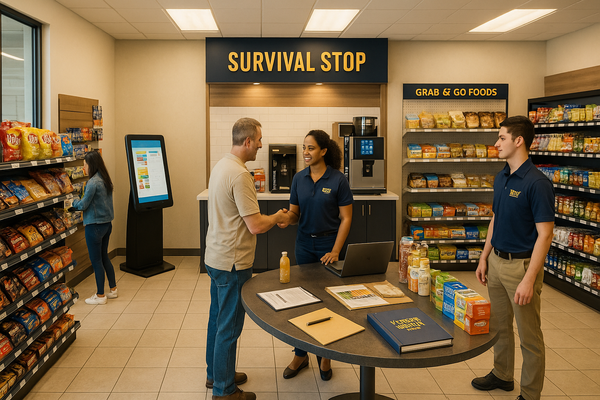When to Call in the Pros: A Convenience Store Guide to Equipment Repair
Convenience stores rely on a complex network of equipment to keep operations running smoothly. But what happens when they break down?

Convenience stores are a bustling hub of activity, relying on a complex network of equipment to keep operations running smoothly. From refrigerators and freezers to coffee machines and point-of-sale systems, these machines are essential for customer satisfaction and profitability. But what happens when they break down? Knowing when to call for professional repair can save you time, money, and headaches. Let's explore the telltale signs that it's time to bring in the experts.
Safety First: When Malfunctions Pose a Risk
Safety should always be your top priority. If a piece of equipment malfunctions in a way that poses a potential risk to employees or customers, it's crucial to call for professional repair immediately. This includes issues like gas leaks, electrical shorts, or malfunctioning refrigeration units that could lead to food spoilage. Don't attempt to fix these problems yourself; leave it to the professionals to ensure a safe and secure environment.
Beyond Basic Troubleshooting: When Simple Fixes Fail
Most convenience store employees are trained in basic troubleshooting for common equipment issues. However, there are times when simple fixes fail to resolve the problem. If you've followed the troubleshooting steps in your manual and the equipment still isn't working, it's time to call for professional help. Continuing to tinker with a malfunctioning machine can exacerbate the issue and lead to more costly repairs down the line.
The Cost of Downtime: When Lost Revenue Outweighs Repair Costs
Time is money in the convenience store industry. A malfunctioning coffee machine, ice dispenser, or ATM can result in lost sales and frustrated customers. If a piece of equipment is critical to your store's operation and its downtime is significantly impacting your revenue, it's worth calling for professional repair to get it back up and running as quickly as possible.
Warranty Woes: When Manufacturer Support is Needed
Many pieces of convenience store equipment come with warranties that cover repairs or replacements for a specific period. If your equipment is still under warranty and malfunctions, contact the manufacturer or authorized repair service to take advantage of the coverage. Attempting to fix it yourself could void the warranty and leave you with a hefty repair bill.
Complexity Calls: When Specialized Expertise is Required
Some convenience store equipment, like refrigeration systems, fuel dispensers, and point-of-sale systems, are complex and require specialized knowledge to repair. Attempting to fix these intricate machines without proper training and expertise can lead to further damage or even safety hazards. Leave these repairs to certified technicians who have the skills and experience to handle them safely and effectively.
Preventative Maintenance: When It's Time for a Checkup
Just like your car needs regular maintenance to keep it running smoothly, so too does your convenience store equipment. Schedule routine inspections and maintenance with qualified technicians to identify potential issues before they become major problems. This proactive approach can save you money in the long run and ensure that your equipment operates at peak efficiency.
Know Your Limits: When DIY Isn't the Answer
While it's tempting to try to fix things yourself to save money, it's important to know your limits. If you're not comfortable or familiar with a particular piece of equipment, don't hesitate to call for professional help. A botched repair job can be more costly and time-consuming than simply calling in an expert from the start.
By understanding these key indicators and knowing when to call for professional repair, you can ensure that your convenience store equipment operates safely, efficiently, and profitably. Remember, investing in timely repairs can save you money, prevent downtime, and enhance the overall customer experience.





